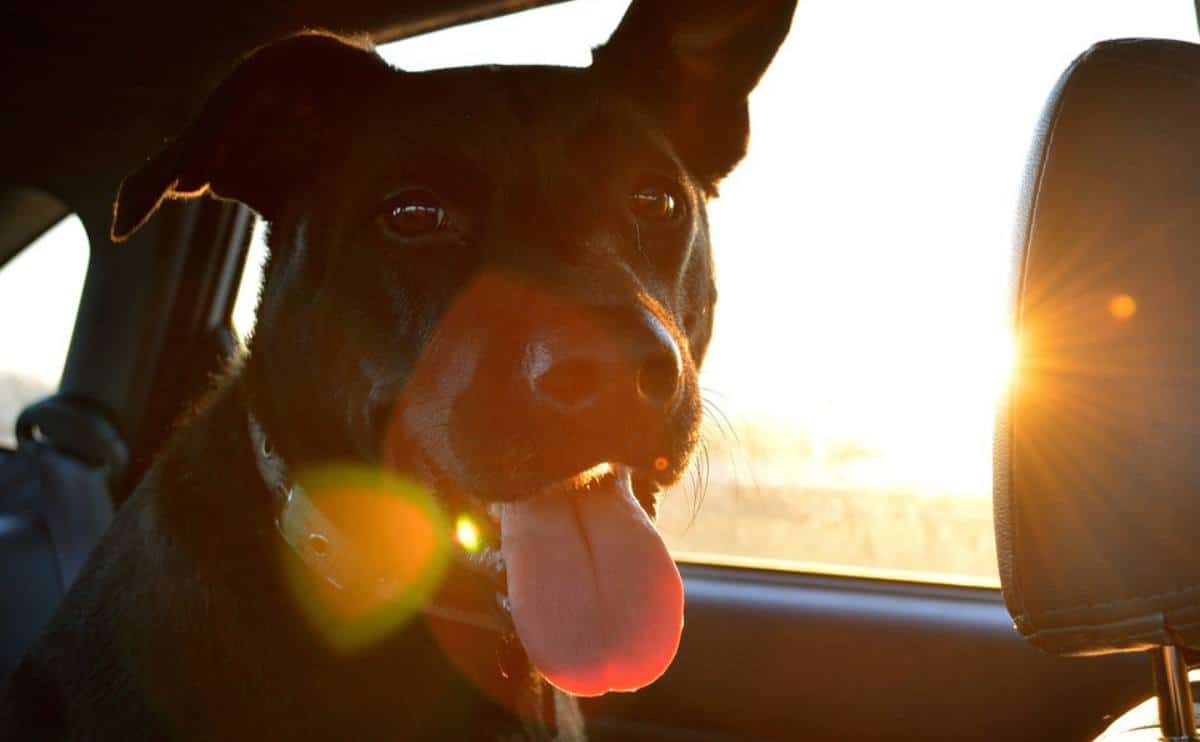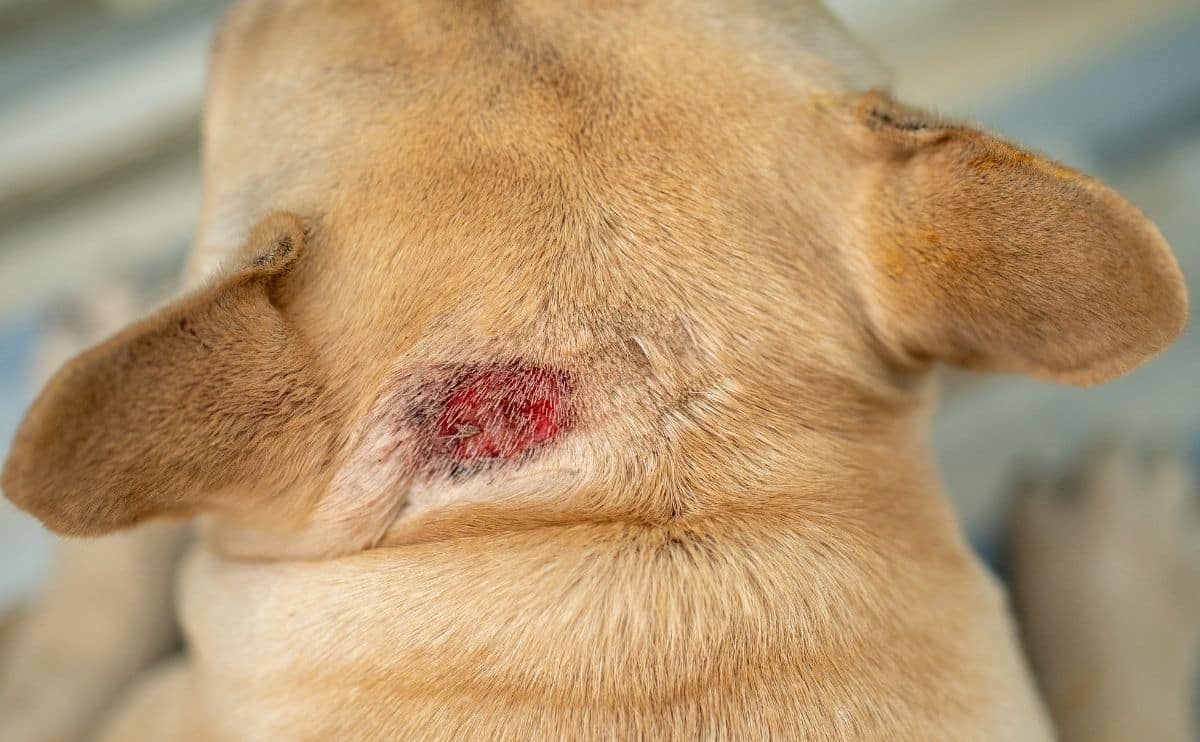How To Calm A Stressed Dog: Signs Of Stress & Relief Tips
When you purchase through links on our site, we may earn a commission. Here’s how it works.

Why is my dog stressed, and how can I help him? You’re certainly not alone if you want help answering these questions. Many dogs can become stressed for a wide variety of reasons — out of boredom or frustration or because they’re scared or anxious about a situation. We’ll help you spot the signs of stress and give you some tips on calming your stressed dog. Learn how to identify when your dog’s stress and anxiety become a long-term problem for his health (and what to do about it).
Table of Contents
Signs Of Stress In Dogs
A stressed dog can exhibit a variety of signs and symptoms that vary in intensity and length of time. Some dogs only have sudden bouts of stress, while others have ongoing anxiety issues leading to longer-term health concerns.
Stressed Dog Body Language & Other Signs
Some behavioral warning signs that your dog may show when stressed include:
- Excessive pacing
- Biting and/or chewing skin, paws, or tail
- Barking or crying when left alone
- Shivering or shaking
- Panting for no noticeable reason
- Yawning or drooling
- Change in posture, e.g., hunched over
- Flattened or alert ears
- Dilated pupils
- Tucked tail
- Hiding/isolation
- Aggression toward other dogs or people
- Increased shedding
Critical Signs Of Stress In A Dog
In cases of chronic (prolonged) or severe stress, dogs can also exhibit the following symptoms:
- Decrease or loss of appetite
- Increased urination
- Vomiting and/or diarrhea
- Skin problems (resulting from excessive biting or licking)
- Compromised immune system
See our FAQ section below for some more detailed questions and answers about dog stress symptoms.
What Is Stress Colitis In Dogs?
You may be wondering, can dogs get diarrhea from stress? Yes, mental or physical stress and anxiety can cause acute colitis or stress colitis in dogs. Symptoms include small volumes of liquid or semi-formed feces, mucous or blood in the stool, straining to defecate, and needing to defecate more frequently.
Treatment of colitis depends on the cause and may include fasting for 24 to 48 hours, a bland diet, fluids, or medications. If you suspect your dog may have stress colitis, seek veterinary care as soon as possible.
Stress Relief For Dogs: 6 Tips
There are many ways you can help alleviate your dog’s stress and anxiety. The most obvious is to remove your dog from what’s disturbing him. But that’s not always possible. So, here are some tips on how to de-stress your dog in different situations.
If your dog’s stress is ongoing and long-term, we encourage you to see your vet to determine the possible causes and best approach to help your pup. This could involve anxiety medication, or your vet may refer you to a dog trainer or behavioral therapist. Each dog’s needs are different, and your vet can help you take the most appropriate course of action.
1. Exercise & Mental Stimulation
If your dog is stressed from boredom, it’s beneficial to take him on more walks and play with him. Many dogs need physical and mental stimulation — and time with you. This can help relieve a dog’s need for companionship and physical activity.
2. Establish A Safe Place In Your Home
If your dog is exhibiting negative behavior or aggression or just feeling stressed, it can help to have an area in your home where he can isolate, feel safe and secure, and calm down. Making his crate a safe space is a good approach. And having a stress-relief dog bed can also help soothe him.
3. Use A Dog Stress Vest Or Jacket
Stress jackets, vests, and “thundershirts” are designed to ease dogs’ anxiety by enveloping their torso in mild pressure to make them feel secure — it’s the same concept as swaddling a baby. These dog stress vests are most helpful in cases of anxiety from noise (e.g., thunder or fireworks), travel, strangers, and separation anxiety.
4. Try Natural Remedies For Stressed Dogs
Some all-natural remedies, such as CBD oil, CBD treats, melatonin, essential oils, or Adaptil stress relief tablets for dogs, may help ease your dog’s anxiety. But be sure to talk to your vet before you give your dog any supplements to make sure they’re safe for your pup.
5. Play Music
Research shows that listening to calming music can benefit your dog in various settings, just as it does with humans. Music can also help reduce noise sensitivity by blocking out scary noises that cause anxiety in some dogs. You could also try noise cancelling headphones for dogs.
6. Give Them Massage
Yes, dogs can also benefit from massage to help them calm down. A brief massage session from you gives your pup soothing physical contact, helping to reduce his stress during situations when he’s fearful or anxious. In a quiet part of your house, use flat palms to press lightly on your dog’s skin. Start at the neck and move your hands down your dog’s body with long strokes.
Get Multiple Pet Insurance Quotes Instantly
Frequently Asked Questions
Here are some questions our readers often ask about stress in dogs.
What Do I Do If My Older Dog Is Stressed By A New Puppy?
If you bring a new furry friend into your home, your older dog could be stressed by a new puppy. After all, it’s your dog’s territorial place. Take the introduction of your new puppy slowly into your home.
Your older dog could try to teach your new puppy the lay of the land in your house and exhibit some dominant behavior. If things don’t go well after a couple of weeks, you may want to seek help from a trainer to help them get along. You have the option of finding an in-person dog trainer or an online dog training class. We recommend Doggy Dan’s Calming Code Method as a good place to start.
How Stressful Is Flying For Dogs?
Think about how stressful airplane travel is for many humans. If your pup can fly with you in the cabin, it can be stressful for them too.
Do Dogs Yawn When Stressed?
Dogs yawn when they’re tired or bored, but they also yawn when they’re stressed. A stressful yawn can last longer and be more pronounced than a sleepy or bored yawn. Dogs often exhibit frequent, excessive yawning when they’re stressed.
Do Dogs Shed More When Stressed?
Yes. Excessive shedding can be a sign of stress in dogs — and it can happen fairly quickly. The theory from experts is that when some dogs get stressed, their bodies produce a lot of adrenaline, which causes immediate hair loss.
Can Dogs Throw Up From Stress?
As dog owners, we know dogs vomit for many reasons, but stress can cause a dog to vomit in severe cases of anxiety. Why? When a dog is majorly stressed, his muscles can tense up, causing vomiting in some cases.
Can Stress Cause A UTI In Dogs?
In dogs who are predisposed to urinary tract infections (UTIs), stress is a factor that can bring them on. UTIs can also be common in dogs who suffer from chronic stress and anxiety. If you’re wondering if the blood in your dog’s urine is from stress, it could be if your dog has a UTI.
Can Stress Cause Pancreatitis In Dogs?
It’s highly unlikely that mental stress alone causes pancreatitis in dogs. The major causes include a high-fat diet (even one fatty meal can trigger the condition), obesity, diabetes, some medications, and physical trauma to the body. Also, some breeds are at a higher risk of developing pancreatitis, including Miniature Schnauzers and some smaller terriers and toy breeds.
Can Stress Cause Seizures In Dogs?
In some cases, severe stress can cause seizures in normally healthy dogs. However, stress is one of the major triggers of seizures for dogs with epilepsy. Stressors can include changes in your dog’s environment or routine, loud noises, bright, flashing lights, car rides, etc.
Can A Dog Die From Stress?
No, there’s no evidence that stress alone can cause a dog to die. But if your dog has an underlying major health problem, stress could exacerbate the condition.
Common Causes Of Stress In Dogs (& Relief Tips)
While the video below focuses on the Pekingese breed, many of the causes of stress and relief strategies apply to many other breeds that suffer from stress and anxiety.
Need More Help With Your Anxious Animal
Learn about the causes and types of dog anxiety. Remember, each case is different, and your canine has specific needs. If you’d like help determining a plan for your pup’s condition, contact your vet and a Certified Applied Animal Behaviorist (CAAB) or a board-certified veterinary behaviorist.



